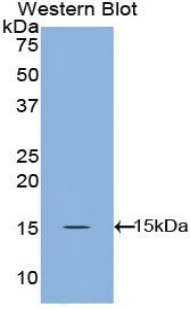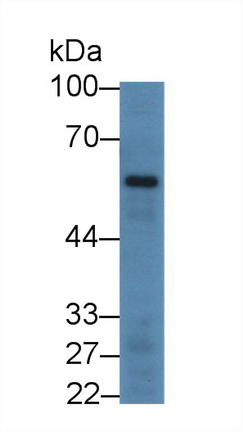Polyclonal Antibody to Angiopoietin 1 (ANGPT1) 

ANG1; AGP1; AGPT; ANG-I
Overview
Properties
- Product No.PAA008Ca02
- Organism SpeciesCanis familiaris; Canine (Dog) Same name, Different species.
- ApplicationsWB
If the antibody is used in flow cytometry, please check FCM antibodies.
Research use only - DownloadInstruction Manual
- CategoryTumor immunityCardiovascular biology
- SourcePolyclonal antibody preparation, Host Rabbit
- Ig Type IgG, Potency n/a
- PurificationAntigen-specific affinity chromatography followed by Protein A affinity chromatography
- LabelNone
- Immunogen RPA008Ca02-Recombinant Angiopoietin 1 (ANGPT1)
- Buffer FormulationPBS, pH7.4, containing 0.02% NaN3, 50% glycerol.
- TraitsLiquid, Concentration 500µg/mL
Sign into your account
Share a new citation as an author
Upload your experimental result
Review

Contact us
Please fill in the blank.
Specifity
The antibody is a rabbit polyclonal antibody raised against ANGPT1. It has been selected for its ability to recognize ANGPT1 in immunohistochemical staining and western blotting.
Usage
Western blotting: 0.5-2µg/mL;
Immunohistochemistry: 5-20µg/mL;
Immunocytochemistry: 5-20µg/mL;
Optimal working dilutions must be determined by end user.
Storage
Store at 4°C for frequent use. Stored at -20°C in a manual defrost freezer for two year without detectable loss of activity. Avoid repeated freeze-thaw cycles.
Stability
The thermal stability is described by the loss rate. The loss rate was determined by accelerated thermal degradation test, that is, incubate the protein at 37°C for 48h, and no obvious degradation and precipitation were observed. The loss rate is less than 5% within the expiration date under appropriate storage condition.
Organism Species More: Rattus norvegicus (Rat)Giveaways
Increment services
-
 Antibody Labeling Customized Service
Antibody Labeling Customized Service
-
 Protein A/G Purification Column
Protein A/G Purification Column
-
 Staining Solution for Cells and Tissue
Staining Solution for Cells and Tissue
-
 Positive Control for Antibody
Positive Control for Antibody
-
 Tissue/Sections Customized Service
Tissue/Sections Customized Service
-
 Phosphorylated Antibody Customized Service
Phosphorylated Antibody Customized Service
-
 Western Blot (WB) Experiment Service
Western Blot (WB) Experiment Service
-
 Immunohistochemistry (IHC) Experiment Service
Immunohistochemistry (IHC) Experiment Service
-
 Immunocytochemistry (ICC) Experiment Service
Immunocytochemistry (ICC) Experiment Service
-
 Flow Cytometry (FCM) Experiment Service
Flow Cytometry (FCM) Experiment Service
-
 Immunoprecipitation (IP) Experiment Service
Immunoprecipitation (IP) Experiment Service
-
 Immunofluorescence (IF) Experiment Service
Immunofluorescence (IF) Experiment Service
-
 Buffer
Buffer
-
 DAB Chromogen Kit
DAB Chromogen Kit
-
 SABC Kit
SABC Kit
-
 Long-arm Biotin Labeling Kit
Long-arm Biotin Labeling Kit
-
 Real Time PCR Experimental Service
Real Time PCR Experimental Service
Citations
- Evaluation of Changes in Doppler Ultrasonography Indices and Levels of Maternal Serum Angiogenic Factors throughout Pregnancy in EwesScience: Article
- High Mobility Group Box 1 Promotes Angiogenesis from Bone Marrow-derived Endothelial Progenitor Cells after Myocardial InfarctionPubMed: 25735431
- Diabetes-induced renal failure is associated with tissue inflammation and neutrophil gelatinase-associated lipocalin: Effects of resveratrolpublication:299492265_Diabetes-induced_renal_failu
- Angiopoietin-1 facilitates recovery of hematopoiesis in radiated micePubmed:27347310
- Increased plasma concentrations of interleukin 35 in patients with coronary artery diseaseJournal:-19
- A new angiogenesis prognostic index with VEGFA, PlGF, and angiopoietin 1 predicts survival in patients with advanced gastric cancerpubmed:28425270
- Flunarizine suppresses endothelial Angiopoietin-2 in a calcium - dependent fashion in sepsis.pubmed:28276491
- The ratio of serum Angiopoietin-1 to Angiopoietin-2 in patients with cervical cancer is a valuable diagnostic and prognostic biomarkerpubmed:28584715
- Prediction of Response to Sorafenib in Hepatocellular Carcinoma: A Marker Panel by Multiple Reaction Monitoring-Mass Spectrometrypubmed:28550167
- Cervical cancer cell–derived angiopoietins promote tumor progressionpubmed:28720059
- RHEUMATOID ARTHRITIS RELATED BIOMARKER20170350884
- Vasculotide, an angiopoietin-1 mimetic, restores microcirculatory perfusion and microvascular leakage and decreases fluid resuscitation requirements in …Pubmed:28968277
- Vasculotide, an angiopoietin-1 mimetic, reduces pulmonary vascular leakage and preserves microcirculatory perfusion during cardiopulmonary bypass in rats10.1016:j.bja.2018.05.049
- Toll-like receptor 2 deficiency hyperactivates the FoxO1 transcription factor and induces aging-associated cardiac dysfunction in micePubmed:29929978
- Clinical Significance of Nectin-4 Expression in Metastasis and Angiogenesis for Tumor RelapseDoi: 10.4143/crt.2018.214
- Prostaglandin-mediated effects in early canine corpus luteum: In vivo effects on vascular and immune factorsPubmed: 30929911
- Association between Upper-airway Surgery and Ameliorative Risk Markers of endothelial function in obstructive Sleep ApneaPubmed: 31882827
- Effects of interleukin-6 and tumor necrosis factor-α on the expression of angiogenic and collagenolytic factors in premature and mature adipocytesPubmed: 32800538
- Effects of protein malnutrition on haematopoietic regulatory activity of bone marrow mesenchymal stem cells33705953
- The effect of targeting Tie2 on hemorrhagic shock-induced renal perfusion disturbances in rats33997943
- Potential of thrombospondin-1 in treatment of polycystic ovary syndrome rat model: a preliminary study34282706
- RAR-Related Orphan Receptor: An Accelerated Preeclampsia Progression by Activating the JAK/STAT3 PathwayPubmed:35619579







